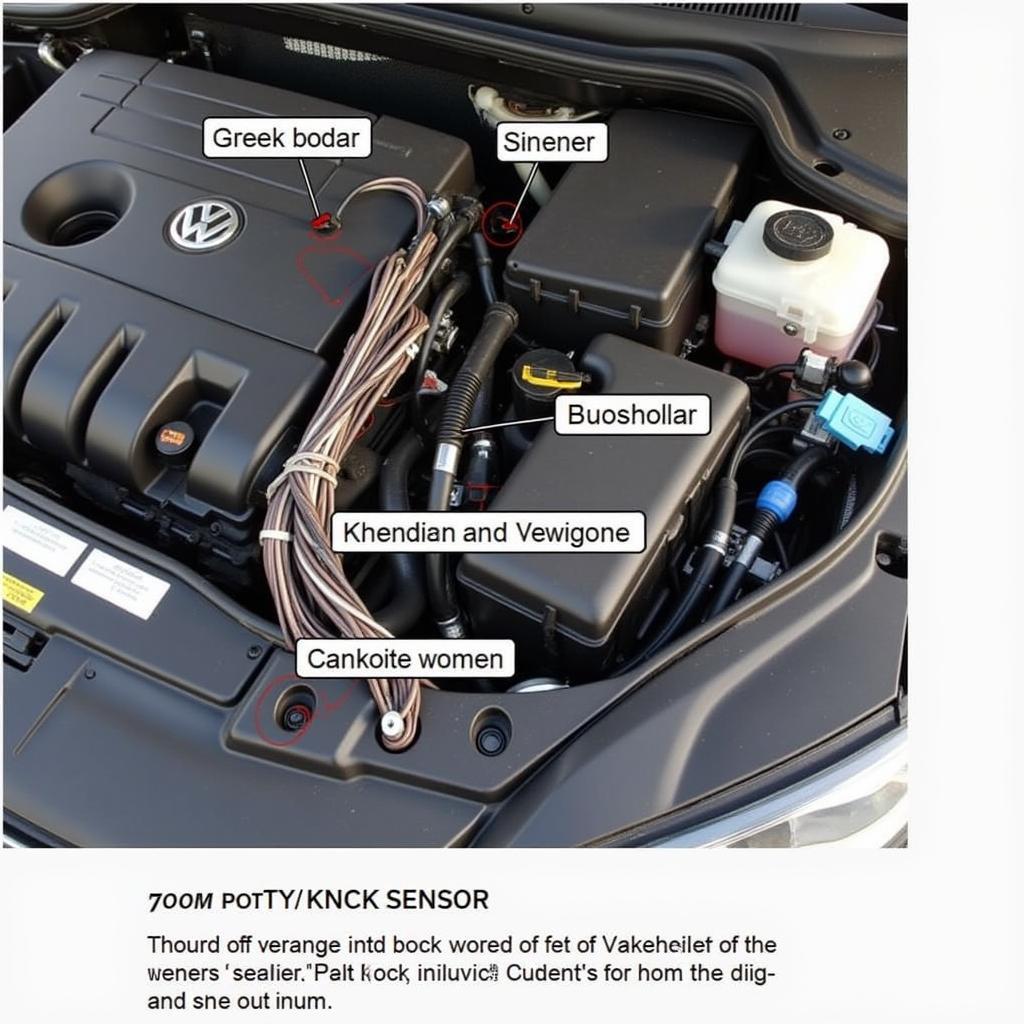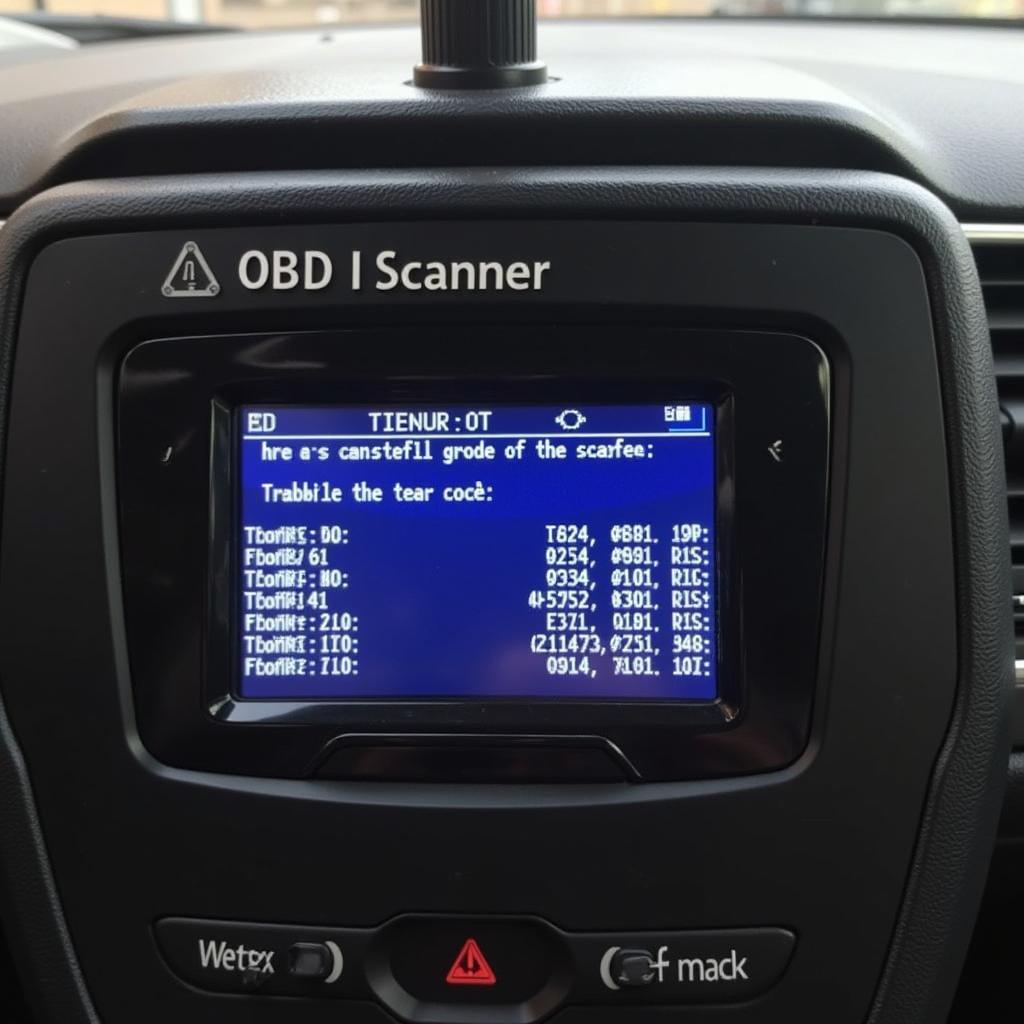Your cart is currently empty!

2013 VW Jetta Knock Sensor Codes: Troubleshooting and Solutions
The dreaded check engine light illuminates your 2013 VW Jetta’s dashboard. A quick scan reveals those pesky knock sensor codes. What do they mean? How do you fix them? This comprehensive guide dives deep into 2013 VW Jetta knock sensor codes, providing you with the knowledge to diagnose and resolve the issue, whether you’re a DIY enthusiast or a seasoned mechanic.
Understanding Knock Sensor Codes in Your 2013 VW Jetta
Knock sensors are vital components in your Jetta’s engine management system. They detect engine knock, also known as detonation, which is the uncontrolled explosion of fuel in the combustion chamber. This can cause significant engine damage if left unchecked. The knock sensor sends a signal to the Engine Control Unit (ECU), which adjusts the ignition timing to prevent further knocking. When a problem arises with the knock sensor system, the ECU generates a diagnostic trouble code (DTC), commonly referred to as a knock sensor code.
Common 2013 VW Jetta Knock Sensor Codes
Several DTCs relate to the knock sensor system in a 2013 VW Jetta. These include:
- P0325: Knock Sensor 1 Circuit Malfunction (Bank 1 or Single Sensor)
- P0326: Knock Sensor 1 Circuit Range/Performance (Bank 1 or Single Sensor)
- P0327: Knock Sensor 1 Circuit Low Input (Bank 1 or Single Sensor)
- P0328: Knock Sensor 1 Circuit High Input (Bank 1 or Single Sensor)
- P0332: Knock Sensor 2 Circuit Malfunction (Bank 2)
- P0333: Knock Sensor 2 Circuit Range/Performance (Bank 2)
Understanding these codes is the first step to resolving your 2013 VW Jetta knock sensor problems.
 2013 VW Jetta Knock Sensor Location Diagram
2013 VW Jetta Knock Sensor Location Diagram
What Causes 2013 VW Jetta Knock Sensor Codes?
A variety of issues can trigger knock sensor codes. Some common culprits include:
- Faulty Knock Sensor: The sensor itself can fail due to age, heat, or vibration.
- Wiring Problems: Damaged, corroded, or loose wiring in the knock sensor circuit can disrupt the signal.
- Loose Knock Sensor: A loose knock sensor can’t accurately detect vibrations.
- Faulty ECU: In rare cases, the ECU itself can malfunction.
- Low-Quality Fuel: Using low-octane fuel can cause knocking and trigger the codes.
Addressing these potential problems requires systematic troubleshooting.
Diagnosing 2013 VW Jetta Knock Sensor Codes
Before replacing any parts, thoroughly diagnose the issue. Start by:
- Visually Inspecting the Wiring and Connector: Look for any obvious damage, corrosion, or loose connections.
- Checking the Knock Sensor: Use a multimeter to test the sensor’s resistance. Consult your vehicle’s repair manual for the correct specifications.
- Testing the Wiring: Check for continuity and shorts in the wiring harness using a multimeter.
“A proper diagnosis saves you time and money. Don’t just throw parts at the problem,” advises John Miller, a veteran automotive electrical engineer with over 20 years of experience.
How to Fix 2013 VW Jetta Knock Sensor Issues
Once you’ve identified the problem, you can begin the repair process.
- Replace the Knock Sensor: If the sensor is faulty, replace it with a new OEM or high-quality aftermarket part.
- Repair the Wiring: Repair or replace any damaged or corroded wiring.
- Tighten the Knock Sensor: Ensure the sensor is properly tightened to the engine block.
- Replace the ECU: This is a last resort and should only be done after exhausting all other possibilities.
- Use High-Quality Fuel: Always use the recommended octane fuel for your Jetta.
“Remember to always disconnect the battery negative terminal before working on any electrical components,” reminds Sarah Johnson, a certified automotive technician specializing in VW vehicles.
Conclusion
Addressing 2013 VW Jetta knock sensor codes is crucial for maintaining engine health and performance. By understanding the codes, diagnosing the problem, and implementing the correct solution, you can get your Jetta running smoothly again. If you need further assistance or have questions, feel free to connect with us. You can reach our team at +1 (641) 206-8880 and our email address: vcdstool@gmail.com or visit our office at 6719 W 70th Ave, Arvada, CO 80003, USA.
 OBD-II Scanner Reading Knock Sensor Codes on a 2013 VW Jetta
OBD-II Scanner Reading Knock Sensor Codes on a 2013 VW Jetta
FAQ
- Can I drive my 2013 VW Jetta with a knock sensor code? While you can drive for a short period, prolonged driving with a knock sensor problem can lead to engine damage.
- How much does it cost to replace a knock sensor? The cost varies depending on labor rates and parts, but typically ranges from $150 to $300.
- Where is the knock sensor located on a 2013 VW Jetta? It’s typically located on the engine block, near the cylinders.
- How do I clear the knock sensor codes after the repair? Use an OBD-II scanner to clear the codes.
- Can bad gas cause a knock sensor code? Yes, using low-octane fuel can cause knocking and trigger the codes.
- What tools do I need to replace a knock sensor? You’ll need basic hand tools like sockets, wrenches, and a torque wrench.
- Is it difficult to replace a knock sensor myself? While it’s possible to DIY, the job can be challenging due to the sensor’s location.
by
Tags:
Leave a Reply